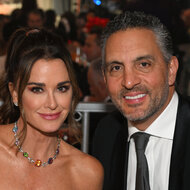
Create a free profile to get unlimited access to exclusive videos, sweepstakes, and more!
C'est La Vie
Toby Young explains why mispronouncing "paella," maybe isn't such a bad thing.
In episode six of Top Chef: Las Vegas I refused to pronounce paella correctly; in this episode, I was rude about the French and their armpits. At this rate, I’ll have no friends left by the end of
the season!
I thought I’d take this opportunity to explain myself. First of all, I don’t think I will have offended any Spanish-speaking people by pronouncing “paella” as “pi-el-a” rather than “pi-ay-a.” I’ve spent a lot of time in Spain— mainly eating in Spanish restaurants— and my pronunciation has never been corrected. On the contrary, Spanish waiters are usually quite amused by Anglophone pronunciations of the dishes on their menus. Spaniards would no more expect me to say “pi-ay-a” than I would expect them to say “London” instead of “Londres.”
In my experience, the only people offended by Anglophone pronunciations of non-English words are upper-middle-class, politically correct English-speaking people. They mistakenly imagine that other, less privileged groups will be offended by your “imperialist” attitude and take offence on their behalf. In fact, to imagine that those who don't speak English as a first
language are a poor, victimized group, requiring the protection of the privileged elite, is far more condescending than mispronouncing non-English words in the first place.
What makes this patronizing attitude so irritating is that the finger-wagging liberals who usually correct my pronunciation are completely inconsistent. For instance, they don’t pronounce “Mexico” as “Me-hi-co” or “Paris” as “par-ee”. So why “pi-ay-a”? That was the point I was making on Episode Six.
I suppose being corrected in this way is progress of a sort. When I was a graduate student at Harvard in 1987, I used to pop into Au Bon Pain every morning in Harvard Square for a coffee and a croissant. Almost without exception, when I pronounced “croissant” in the French way — ie, without sounding the “t” — the person serving me would say, “Do you mean a croissant?”, emphasizing the “t” as if talking to an idiot. At first, I used to have fun with this: “What,
you can’t understand me unless I pronounce the word incorrectly?” But in the end I just gave up and started emphasizing the “t” myself. It seemed so much simpler.
Of course, the French do care about foreigners mispronouncing their words— which is why we Brits try usually try and mispronounce them as often as possible. We call it “Franglais” and it falls under the heading of “friendly banter” rather than “racial insensitivity.” It’s part of our long-standing rivalry—and, believe me, they give as good as they get. They refer to British people over there as “roast beef,” except they pronounce it “ross buff”. C’est la vie.
I think we just have to abandon the idea that there is a correct and incorrect way of mispronouncing any word. A world in which all ethnic groups speak slightly differently, following their own, idiosyncratic rules, is preferable to one in which everyone is forced to pronounce things the same way — "pi-ya-a" — by a bunch of guilty white people. In the end, that's far more "imperialist" than saying "pi-el-a".


